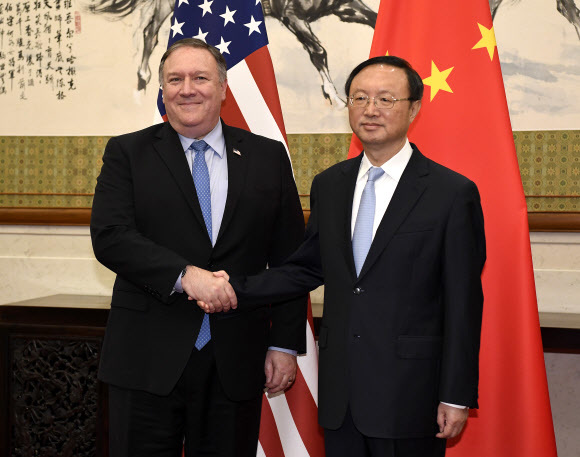 |
|
US Secretary of State Mike Pompeo with Chinese Central Foreign Affairs Commission General Office Chief Yang Jiechi in Beijing on Oct. 8.
|
US secretary of state discussed North Korean nuclear issue and US-China relations with Yang Jiechi
US Secretary of State Mike Pompeo met with Central Foreign Affairs Commission General Office Chief Yang Jiechi and other members of China’s diplomatic “control tower” in Beijing on Oct. 8 to discuss the North Korean nuclear issue. Pompeo met with Yang at the Diaoyutai State Guesthouse that afternoon and discussed the North Korean nuclear issue and US-China relations, Chinese state-run media reported. A member of the 25-person politburo that serves as the top leadership of the Chinese Communist Party, Yang is considered the top control tower for foreign relations within the Chinese party and government organization. Pompeo previously met with Chinese Foreign Minister Wang Yi. The two sides exchanged views that day on a number of current economic and security-related issues between them, including the North Korean nuclear issue and the associated matters of China’s participation in a declaration ending the Korean War, as well as the US-China trade war and the ongoing conflict in the South China Sea. In terms of the first order of business – the North Korean nuclear issue – Pompeo informed the Chinese side of details from his North Korea visit the day before and praised the efforts Beijing has made toward the Korean Peninsula’s denuclearization, the People’s Daily reported. Speaking to reporters on the first day of his Northeast Asia tour on Oct. 5, Pompeo said the US “welcome[s] China’s efforts to continue to enforce the UN Security Council resolutions” and “value[s] their participation in this process.” Questions regarding two sides’ disagreements regarding UN sanctions on NK But questions remain over whether the two sides can bridge their differences on the question of easing sanctions. While Washington maintains that UNSC sanctions must be faithfully enforced until North Korea achieves real denuclearization, Beijing has argued that the US must adopt suitable “corresponding measures” to answer the various preemptive denuclearization steps taken by Pyongyang. Wang told Pompeo that the US “must take seriously North Korea’s reasonable demands in the areas of security and development and answer them positively.” The two sides appear to have confirmed each other’s positions on the second issue concerning end-of-war and peace declarations. The prevailing view among observers is that Washington would prefer for Beijing to take part at the peace agreement stage rather than the Korean War-ending declaration stage. In his remarks on Oct. 5, Pompeo said, “If we do this [negotiation] well, we will have signed a peace treaty that ends the armistice, and China will be part of that.” Conversely, China has signaled its intent to participate in the preceding end-of-war declaration stage. China states displeasure regarding issues of trade, Taiwan and South China Sea On the last issue concerning conflicts between the two sides, the Chinese side frankly stated its displeasure in front of Pompeo. “We look forward to the US correcting its mistakes and ceasing actions that harm China’s interests,” Yang said, emphasizing China’s positions on the trade conflicts with the US and issues concerning Taiwan and the South China Sea. Wang also demanded halts to weapon exports to Taiwan, diplomatic pressures on countries that have or hope to have new diplomatic ties with China, and a halt in support for those pursuing Taiwanese independence. “The US has been constantly stirring up China-US trade frictions recently and engaging in actions that harm China’s interests on issues such as Taiwan,” Wang said. The Chinese government reported Pompeo as saying in response that the US is “not opposed to China’s development, has no intent to ‘hem China in,’ and has never directly curbed Chinese policies.” Unlike his China visit in June, Pompeo’s latest visit included no courtesy call on Chinese President Xi Jinping. Pompeo arrived in Beijing after lunch on Oct. 8 and left before dinner the same evening. By Kim Oi-hyun, Washington correspondent Please direct comments or questions to [english@hani.co.kr]






